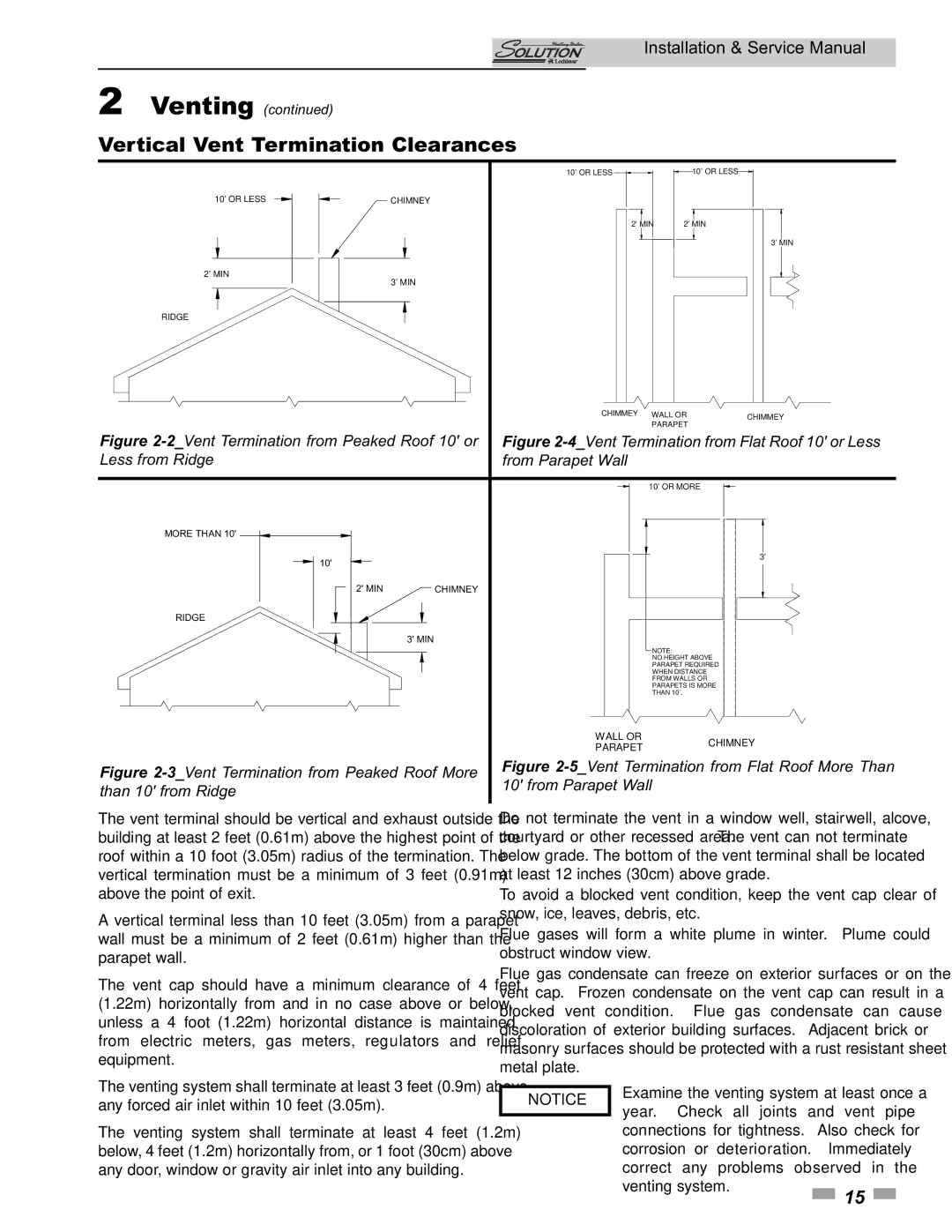
Installation & Service Manual
2Venting (continued)
Vertical Vent Termination Clearances
10' OR LESS | 10' OR LESS |
10' OR LESS | CHIMNEY |
|
| 2' MIN | 2' MIN |
2' MIN
RIDGE
3' MIN
3' MIN
| CHIMMEY WALL OR | CHIMMEY |
| PARAPET |
|
Figure | Figure | |
Less from Ridge | from Parapet Wall |
|
|
| 10' OR MORE |
MORE THAN 10' |
|
|
10' |
| 3' |
|
| |
2' MIN | CHIMNEY |
|
RIDGE |
|
|
| 3' MIN |
|
|
| NOTE: |
|
| NO HEIGHT ABOVE |
|
| PARAPET REQUIRED |
|
| WHEN DISTANCE |
|
| FROM WALLS OR |
|
| PARAPETS IS MORE |
|
| THAN 10'. |
| WALL OR | CHIMNEY |
| PARAPET | |
|
|
Figure | Figure | |
10' from Parapet Wall | ||
than 10' from Ridge | ||
|
The vent terminal should be vertical and exhaust outside the building at least 2 feet (0.61m) above the highest point of the roof within a 10 foot (3.05m) radius of the termination. The vertical termination must be a minimum of 3 feet (0.91m) above the point of exit.
A vertical terminal less than 10 feet (3.05m) from a parapet wall must be a minimum of 2 feet (0.61m) higher than the parapet wall.
The vent cap should have a minimum clearance of 4 feet (1.22m) horizontally from and in no case above or below, unless a 4 foot (1.22m) horizontal distance is maintained from electric meters, gas meters, regulators and relief equipment.
The venting system shall terminate at least 3 feet (0.9m) above any forced air inlet within 10 feet (3.05m).
The venting system shall terminate at least 4 feet (1.2m) below, 4 feet (1.2m) horizontally from, or 1 foot (30cm) above any door, window or gravity air inlet into any building.
Do not terminate the vent in a window well, stairwell, alcove, courtyard or other recessed area. The vent can not terminate below grade. The bottom of the vent terminal shall be located at least 12 inches (30cm) above grade.
To avoid a blocked vent condition, keep the vent cap clear of snow, ice, leaves, debris, etc.
Flue gases will form a white plume in winter. Plume could obstruct window view.
Flue gas condensate can freeze on exterior surfaces or on the vent cap. Frozen condensate on the vent cap can result in a blocked vent condition. Flue gas condensate can cause discoloration of exterior building surfaces. Adjacent brick or masonry surfaces should be protected with a rust resistant sheet metal plate.
NOTICE | Examine the venting system at least once a | ||||
year. Check all joints and vent pipe | |||||
| |||||
| |||||
| connections for tightness. Also check for | ||||
| corrosion or deterioration. Immediately | ||||
| correct any problems observed in the | ||||
| venting system. |
| 15 |
| |
|
|
| |||
|
|
|
| ||
